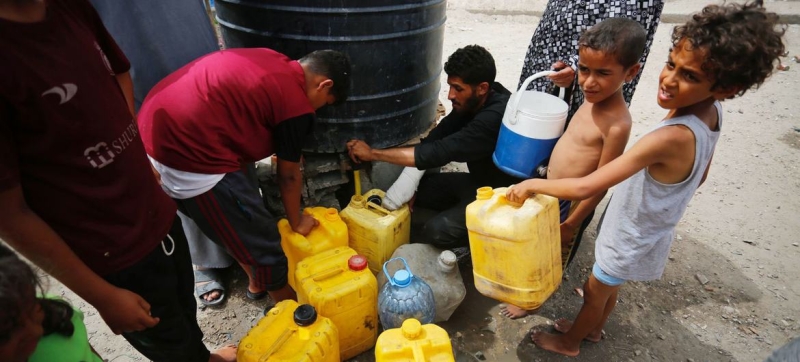
Access to clean drinking water in the Gaza Strip is limited. It is increasingly difficult to deliver humanitarian aid to the south and center of Gaza Humanitarian assistance
Escalating fighting in the southern and central Gaza Strip is making it nearly impossible for humanitarian organizations to deliver food aid, World Food Program (WFP) Deputy Executive Director Karl Skau said Friday following a two-day visit to the enclave.
“When you drive through Gaza City to Jabaliya, the destruction is incredible. In the north of the Gaza Strip, I have not seen a single building intact, while constant shelling continues,” Skau said.
“The people here are traumatized and exhausted. One woman who lost her husband told me that this war lasts 250 days, but it seems to her that it lasts 250 years,” he added.
Robbery, violence and insecurity
WFP staff report that with active fighting in the southern and central areas of the sector, as well as the lawlessness generated by despair, it is almost impossible to deliver humanitarian aid in the required volumes.
“It’s becoming increasingly difficult to do our jobs,” said Karl Skau.
“Employees spend five to eight hours each day waiting at checkpoints. Rockets are hitting our premises… The breakdown of law and order means that we also face looting and violence in a huge security vacuum,” he said.
The food situation in the south is deteriorating
WFP fears that southern Gaza will soon there will be the same famine as previously in the north. Karl Skau warned that the situation there was rapidly deteriorating.
“A million people have been driven out of Rafah and are trapped in a densely populated area near the beach in the scorching summer heat. We drove past rivers of sewage,” he said.
The WFP says the aid situation in the northern Gaza Strip has improved, with supplies being delivered through the West Erez crossing.
However, the UN agency warned that aid delivery must be continuous and larger-scale. Access to clean water, healthcare, bakery fuel and medicine is also important.
Supporting local markets
Skau also noted that the WFP is considering the possibility of supporting markets in the Gaza Strip, as well as providing money to the population so that people can gradually begin to restore normal life.
“Emergency relief is still critical, but we also need to start giving people some hope by supporting bakeries and markets, and go beyond meeting food needs for survival,” he continued .
“On my previous visit in November, the people I met were angry. Now they are tired and just want this war to end,” Skau added. He was in the region for three days. In addition to Gaza, he also visited the West Bank and Jerusalem.
In May, WFP provided assistance to more than a million people in the West Bank and Gaza, although rations were cut due to restrictions access and dwindling food supplies.
WFP continues to call for an immediate ceasefire in Gaza and secure and ongoing access for aid delivery.
